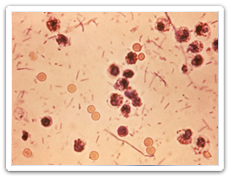Shigellosis (Shigella spp.)
 Shigellosis is an acute intestinal illness caused by bacteria belonging to the Shigella family. The infection is spread by the fecal-oral route, either directly by person-to-person contact or indirectly by eating or drinking fecally contaminated food or water. Person-to-person transmission is most common among children and in circumstances where hygiene practices are poor. In these cases, persons do not wash their hands thoroughly after using the toilet. Infection then passes to another person either directly by physical touch or indirectly by contaminated food.
Shigellosis is an acute intestinal illness caused by bacteria belonging to the Shigella family. The infection is spread by the fecal-oral route, either directly by person-to-person contact or indirectly by eating or drinking fecally contaminated food or water. Person-to-person transmission is most common among children and in circumstances where hygiene practices are poor. In these cases, persons do not wash their hands thoroughly after using the toilet. Infection then passes to another person either directly by physical touch or indirectly by contaminated food.
Image Content Provider : CDC
Symptoms
Symptoms usually start 1 to 3 days after exposure and go away in 5 to 7 days. A person with shigellosis may experience mild or severe symptoms, or no symptoms at all. Symptoms include diarrhea (sometimes with blood and/or mucus), fever and nausea. Sometimes, a person with shigellosis will also have cramps, vomiting and toxaemia ("poisons" in the blood).
Causes
Shigellosis is very infectious and spreads easily. Most Shigella infections are caused by bacteria passing from stools or soiled fingers of one person to the mouth of another person, when sanitation and hygiene are poor, for example:
- in day care centres, if hands are not washed each time you touch children and change diapers
- if food is contaminated by infected food handlers, or by flies picking up contamination from latrines
- if drinking water is contaminated by the feces of infected animals or people (e.g. water improperly treated in developing countries)
- if swimming at beaches with contaminated water
Young children, seniors and individuals with weakened immune systems such as those living with AIDS or cancer, or transplant patients receiving immunosuppressive drugs are more at risk of serious illness.
Treatment
Persons with mild infection usually recover quickly without antibiotic treatment. However, an appropriate antibiotic treatment kills the Shigella and may shorten the illness by a few days. Drinking plenty of fluids to avoid dehydration is important. If a person has severe symptoms that include fever, abdominal pain or cramps and bloody diarrhea they should seek medical attention.
Prevention
Shigellosis is easily prevented by practicing frequent hand washing, following good food safety practices, providing safe drinking water and by following other practices that break the fecal-oral links of illness.
Manitoba Health Resources
For the Public
For Health Care Providers
Other Resources
- Public Health Agency of Canada - Shigellosis
- Government of Canada - Shigella
- BC Centre for Disease Control - Shigella
- Centers for Disease Control and Prevention - Shigellosis
Information for Travelers
Communicable Disease
Control (CDC) Health Links – Info Santé |



